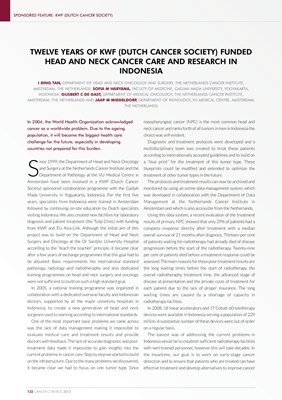
SPONSORED FEATURE: KWF (DUTCH CANCER SOCIETY)
TWELVE YEARS OF KWF (DUTCH CANCER SOCIETY) FUNDED
HEAD AND NECK CANCER CARE AND RESEARCH IN
INDONESIA
I BING TAN, DEPARTMENT OF HEAD AND NECK ONCOLOGY AND SURGERY, THE NETHERLANDS CANCER INSTITUTE,
AMSTERDAM, THE NETHERLANDS, SOFIA M HARYANA, FACULTY OF MEDICINE, GADJAH MADA UNIVERSITY, YOGYAKARTA,
INDONESIA, GIJSBERT C DE GAST, DEPARTMENT OF MEDICAL ONCOLOGY, THE NETHERLANDS CANCER INSTITUTE,
,
AMSTERDAM, THE NETHERLANDS AND JAAP M MIDDELDORP DEPARTMENT OF PATHOLOGY, VU MEDICAL CENTRE, AMSTERDAM,
THE NETHERLANDS
In 2004, the World Health Organization acknowledged nasopharyngeal cancer (NPC) is the most common head and
cancer as a worldwide problem. Due to the ageing neck cancer and ranks forth of all tumors in men in Indonesia the
population, it will become the biggest health care choice was self-evident.
challenge for the future; especially in developing Diagnostic and treatment protocols were developed and a
countries not prepared for this burden. multidisciplinary team was created to treat these patients
according to internationally accepted guidelines and to build on
S
ince 1999, the Department of Head and Neck Oncology a “blue print” for the treatment of this tumor type. These
and Surgery at the Netherlands Cancer Institute and the blueprints could be modified and extended to optimize the
Department of Pathology at the VU Medical Centre in treatment of other tumor types in the future.
Amsterdam have been involved in a KWF (Dutch Cancer The protocols and treatment results can now be archived and
Society) sponsored collaboration programme with the Gadjah monitored by using an online data-management system, which
Mada University in Yogyakarta, Indonesia. For the first five was developed in collaboration with the Department of Data
years, specialists from Indonesia were trained in Amsterdam Management at the Netherlands Cancer Institute in
followed by continuing on-site education by Dutch specialists Amsterdam and which is also accessible from the Netherlands.
visiting Indonesia. We also created new facilities for laboratory Using this data system, a recent evaluation of the treatment
diagnosis and patient treatment (the Tulip Clinic) with funding results of primary NPC showed that only 29% of patients had a
from KWF and EU Asia-Link. Although the initial aim of this complete response directly after treatment with a median
project was to build on the Department of Head and Neck overall survival of 21 months after diagnosis. Thirteen per cent
Surgery and Oncology at the Dr Sardjito University Hospital of patients waiting for radiotherapy had already died of disease
according to the “teach the teacher” principle, it became clear progression before the start of the radiotherapy. Twenty-nine
after a few years of exchange programmes that this goal had to per cent of patients died before a treatment response could be
be adjusted. Basic requirements like international standard assessed. The main reasons for these poor treatment results are
pathology, radiology and radiotheraphy and also dedicated the long waiting times before the start of radiotherapy, the
training programmes on head and neck surgery and oncology overall radiotheraphy treatment time, the advanced stage of
were not sufficient to build on such a high standard goal. disease at presentation and the private costs of treatment for
In 2005, a national training programme was organized in each patient due to the lack of proper insurance. The long
collaboration with a dedicated overseas faculty and Indonesian waiting times are caused by a shortage of capacity in
doctors, supported by all the major university hospitals in radiotherapy facilities.
Indonesia, to create a new generation of head and neck In 2008, 18 linear accelerators and 17 Cobalt-60 teletherapy
surgeons used to working according to international standards. devices were available in Indonesia serving a population of 229
One of the most important basic problems we came across million. A substantial number of these devices were out of order
was the lack of data management making it impossible to on a regular basis.
evaluate medical care and treatment results and provide The easiest way of addressing the current problems in
doctors with feedback. The lack of accurate diagnostic and post- Indonesia would be to establish sufficient radiotherapy facilities
treatment data made it impossible to gain insights into the with well-trained personnel, however this will take decades. In
current problems in cancer care. Step by step we started to build the meantime, our goal is to work on early-stage cancer
on the infrastructure. Due to the many problems we discovered, detection and to ensure that patients who are treated can have
it became clear we had to focus on one tumor type. Since effective treatment and develop alternatives to improve cancer
122 CANCER CONTROL 2013